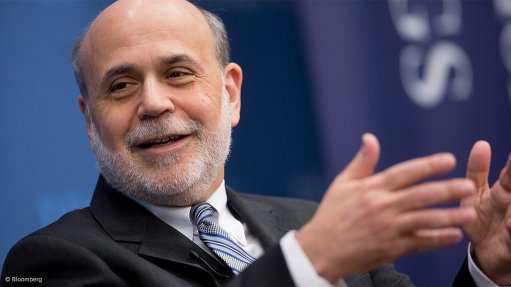
Ben Bernanke
Former Federal Reserve chairperson Ben Bernanke, who is now an economist at the Brookings Institution, described as “strange” the persistent suggestions that the US central bank failed to consult emerging markets on the policy actions it had taken in the wake of the 2008 financial crisis, including quantitative easing and current moves to taper the asset-purchase programme.
However, in one of his first public engagements since handing over the Janet Yellen in February, Bernanke told delegates to the 2014 Discovery Leadership Summit in Johannesburg that ongoing communication had emerged as a top priority during his tenure and that such exchanges remained crucial.
Extensive presentations and interactions were made to global central bank governors at least "8 to 10 times a year" at various international forums, including during the six meetings that took place yearly in Basel, Switzerland, under the aegis of the Bank for International Settlements.
Bernanke said the Fed had given much thought to the implications of its unconventional monetary policy actions not only for the US economy, but also the global economy and that it had “worked hard” to improve its communication with other economies.
He said he had taken heed of the appeal for the Fed to “communicate as clearly as possible” its tapering plans so as to reduced the potential for negative fallout in emerging markets. In those interactions, the governors had also indicated that they were supportive of plans to slow asset purchases, if that slowdown signalled a return to US economic strength.
There was, nevertheless, concern about the possible negative impact of tapering on open emerging market economies, particularly ones such as South Africa that were running fiscal and current account deficits.
“But it’s important that this is not a one-way street – there are things that emerging markets can do to improve the situation,” Bernanke added. There was room, for instance, for those economies running twin deficits to “take defensive action” to improve their macroeconomic balances.
“The real key question is: what was the alternative to [quantitative easing]? It’s really important for emerging markets that the United States economy did not go into deflation and did not go into recession again. Given that fiscal policies were pretty passive, which is a problem, monetary policy had to take on much of the burden.”
He stressed that he and the Fed listened carefully to the genuine concerns of emerging markets, but that these needed to be addressed in a “collegial and cooperative manner”.
There was a logical prospect of the US economy having a “pretty good year” in 2014, despite some weak economic reports in the early part of the year. “There are a number of things going on that give a reasonable expectation of roughly 3% growth in 2014. But it remains to be seen.”